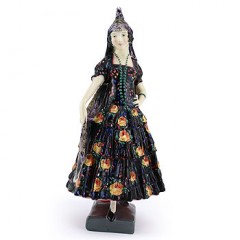 elizabethana, guardando la storia, musica
elizabethana, guardando la storia, musica  3 Comments
3 Comments More Spanish Ladies
 Si direbbe che The Spanish Lady abbia incuriosito.
Si direbbe che The Spanish Lady abbia incuriosito.
I. mi chiede (via email!) se sono sicura delle parole, perché una volta a Dublino ne ha sentito una versione diversa…
E io rispondo che, dal XVII Secolo in qua, di varianti ce ne sono diverse, e tendono a ricadere in due categorie – corteggiamento e corteggiamento-con-duello, come in questa versione:
As I went out by Dublin City at the hour of 12 at night
Who should I see but a Spanish lady washing her feet by candlelight
First she washed them then she dried them all by the fire of amber coal
In all my life I ne’er did see a maid so sweet about the sole
I asked her would she come out walking and went on till the grey cocks crew
A coach I stopped then to instate her and we rode on till the sky was blue
Combes of amber in her hair were and her eyes knew every spell
In all my life I ne’re did see a woman I could love so well
But when I came to where I found her and set her down from the halted coach
Who was there with his arms folded but the fearful swordsman Tiger Roche
Blades were out ‘twas thrust and cut, never a man gave me more fright
Till I lay him dead on the floor where she stood holding the candlelight
So if you go to Dublin City at the hour of twelve at night
Beware of the girls who sit in their windows combing their hair in the candlelight
I met one and we went walking, I thought that she would be my wife
When I came to where I found her, if it wasn’t for my sword I’d have lost my life.
E a dire la verità, mi piace da matti il corteggiatore/spadaccino che ammette di avere avuto lo spavento della sua vita – e di esserne uscito più cauto in fatto di graziose fanciulle alla finestra…
 Incidentalmente, il dublinese David “Tiger” Roche era uno di quegli avventurieri e duellatori dalla variegata carriera che solo nel Settecento. Figlio di un gentiluomo, ufficiale a sedici anni, fascinoso e violento, eroe delle Indian Wars, degradato con ignominia per furto, ripetutamente processato per omicidio, parlamentare mancato, cronicamente indebitato, cacciatore di dote… Alla fin fine pare che fosse innocente della maggior parte delle malefatte di cui era accusato, ma va’ a sapere, e comunque aveva questa tendenza a vendicarsi con prontezza ed efficacia, hence the nickname of “Tiger”. Non è improbabile che fosse l’ispirazione per il Barry Lyndon di Thackeray, e comunque si capisce il nervosismo del narratore…
Incidentalmente, il dublinese David “Tiger” Roche era uno di quegli avventurieri e duellatori dalla variegata carriera che solo nel Settecento. Figlio di un gentiluomo, ufficiale a sedici anni, fascinoso e violento, eroe delle Indian Wars, degradato con ignominia per furto, ripetutamente processato per omicidio, parlamentare mancato, cronicamente indebitato, cacciatore di dote… Alla fin fine pare che fosse innocente della maggior parte delle malefatte di cui era accusato, ma va’ a sapere, e comunque aveva questa tendenza a vendicarsi con prontezza ed efficacia, hence the nickname of “Tiger”. Non è improbabile che fosse l’ispirazione per il Barry Lyndon di Thackeray, e comunque si capisce il nervosismo del narratore…
Alla versione che ho riportato nell’altro post, invece, manca questa strofa qui – quella maudlin:
I’ve wandered north and I’ve wandered south
By Stoneybatter and Patrick’s Close
Up and around by the Gloucester Diamond
And back by Napper Tandy’s house.
Old age has laid her hand on me
Cold as a fire of ashy coals
But where o where is the Spanish Lady,
Neat and sweet about the soul?
Stoneybatter è un quartiere di Dublino, e Napper Tandy un rivoluzionario irlandese del Settecento, paladino del libero commercio e personaggio turbolento.
Ed è chiaro che in entrambi i casi stiamo parlando di versioni settecentesche o più tardi. Chissà chi era in origine lo spadaccino feroce – e di chi la casa…
Poi S. mi chiede (sempre via email…) se è la stessa canzone che cantano in Moby Dick e nelle aventure di Sharpe. Ebbene, no: almeno per quanto riguarda Melville, si tratta invece di una canzone navale del tardo Settecento:
Farewell and adieu to you, Spanish Ladies,
Farewell and adieu to you, ladies of Spain;
For we’ve received orders for to sail for old England*,
And we may never see you fair ladies again.
Chorus:
We will rant and we’ll roar like true British sailors,
We’ll rant and we’ll roar all on the salt seas.
Until we strike soundings in the channel of old England;
From Ushant to Scilly is thirty-five** leagues.
We hove our ship to with the wind from sou’west, boys
We hove our ship to, deep soundings to take;
‘Twas forty-five fathoms, with a white sandy bottom,
So we squared our main yard and up channel did make.
chorus
The first land we sighted was call-ed the Dodman,
Next Rame Head off Plymouth, Start, Portland and Wight;
We sailed by Beachy, by Fairlight and Dover,
And then we bore up for the South Foreland light.
chorus
Then the signal was made for the grand fleet to anchor,
And all in the Downs that night for to lie;
Let go your shank painter, let go your cat stopper***
Haul up your clewgarnets, let tacks and sheets fly!****
chorus
Now let ev’ry man drink off his full bumper,
And let ev’ry man drink off his full glass;
We’ll drink and be jolly and drown melancholy,
And here’s to the health of each true-hearted lass.
Sinceramente in Sharpe non me la ricordo – però non ho letto tutti i romanzi della serie. O forse magari è nel film? Perché sembra non esserci cine(tele)avventura navale d’ambientazione inglese in cui gli sceneggiatori non piazzino Spanish Ladies – e mi vengono in mente Master & Commander e Hornblower, per dire…
E già che ci siamo, lasciate che aggiunga un’altra signora spagnuola – la protagonista di questa ballata elisabettiana:
Will you hear a Spanish lady,
How shee wooed an English man?
Garments gay and rich as may be
Decked with jewels she had on.
Of a comely countenance and grace was she,
And by birth and parentage of high degree.
As his prisoner there he kept her,
In his hands her life did lye!
Cupid’s bands did tye them faster
By the liking of an eye.
In his courteous company was all her joy,
To favour him in any thing she was not coy.
But at last there came commandment
For to set the ladies free,
With their jewels still adorned,
None to do them injury.
Then said this lady mild, “Full woe is me;
O let me still sustain this kind captivity!
“Gallant captain, shew some pity
To a ladye in distresse;
Leave me not within this city,
For to dye in heavinesse:
Thou hast this present day my body free,
But my heart in prison still remains with thee.”
“How should’st thou, fair lady, love me,
Whom thou knowest thy country’s foe?
Thy fair wordes make me suspect thee:
Serpents lie where flowers grow.”
“All the harme I wishe to thee, most courteous knight,
God grant the same upon my head may fully light!
“Blessed be the time and season,
That you came on Spanish ground;
If our foes you may be termed,
Gentle foes we have you found:
With our city, you have won our hearts eche one,
Then to your country bear away, that is your owne.”
“Rest you still, most gallant lady;
Rest you still, and weep no more;
Of fair lovers there is plenty,
Spain doth yield a wonderous store.”
“Spaniards fraught with jealousy we often find,
But Englishmen through all the world are counted kind.”
“Leave me not unto a Spaniard,
You alone enjoy my heart:
I am lovely, young, and tender,
Love is likewise my desert:
Still to serve thee day and night my mind is prest;
The wife of every Englishman is counted blest.”
“It wold be a shame, fair lady,
For to bear a woman hence;
English soldiers never carry
Any such without offence.”
“I’ll quickly change myself, if it be so,
And like a page Ile follow thee, where’er thou go.”
“I have neither gold nor silver
To maintain thee in this case,
And to travel is great charges,
As you know in every place.”
“My chains and jewels every one shal be thy own,
And eke five hundred pounds in gold that lies unknown.”
“On the seas are many dangers,
Many storms do there arise,
Which wil be to ladies dreadful,
And force tears from watery eyes.”
“Well in troth I shall endure extremity,
For I could find in heart to lose my life for thee.”
“Courteous ladye, leave this fancy,
Here comes all that breeds the strife;
I in England have already
A sweet woman to my wife:
I will not falsify my vow for gold nor gain,
Nor yet for all the fairest dames that live in Spain.”
“O how happy is that woman
That enjoys so true a friend!
Many happy days God send her;
Of my suit I make an end:
On my knees I pardon crave for my offence,
Which did from love and true affection first commence.
“Commend me to thy lovely lady,
Bear to her this chain of gold;
And these bracelets for a token;
Grieving that I was so bold:
All my jewels in like sort take thou with thee,
For they are fitting for thy wife, but not for me.
“I will spend my days in prayer,
Love and all her laws’ defye;
In a nunnery will I shroud mee
Far from any companye:
But ere my prayers have an end, be sure of this,
To pray for thee and for thy love I will not miss.
“Thus farewell, most gallant captain!
Farewell too my heart’s content
Count not Spanish ladies wanton,
Though to thee my love was bent:
Joy and true prosperity goe still with thee!”
“The like fall ever to thy share, most fair ladìe.”
Magari vi ricordate questo post, e il filmato in cui Vivien Leigh e Laurence Olivier (non?) la cantano in Fire Over England.
Tradizione vuole che la ballata fosse ispirata a una storia vera, quella di sir Richard Levison (o forse invece sir John Bolle) e della sua bella prigionera, catturata durante il raid di Cadice nel 1596.
Vero o no (e tutto sommato spero abbastanza di no: did Sir Richard tell the tale? How ungentlemanly of him, after all!) bisogna pensare che per un certo numero di secoli la Signora Spagnuola abbia incarnato in Inghilterra una certa idea di bellezza esotica e limitatamente passionale.
Un’idea abbastanza radicata da farci su ballate e canzoni, da conservare ballate e canzoni attraverso i secoli, variandone i versi per adattarle all’epoca. E abbastanza perché secoli più tardi, cercando qualcosa di significativo del tempo da far cantare ai propri personaggi, romanzieri e sceneggiatori tendano a ritrovare sempre le signore spagnuole.
Si direbbe che, come pensa Miss Minchin del titolo immaginario di Sara Crewe, parlare di signore spagnuole in Inghilterra sia romantico & pittoresco.
_____________________________________________
* O anche we sail under orders
** Oppure 34 o 45…
*** Vale a dire “gettate le ancore”
**** Ovvero “ammainate le vele”
La Spanish Lady ha, nell’Inghilterra protestante, una immagine di esotismo e virtù forzata (con il convento come destinazione finale) che le bonny lasses nazionali hanno perduto.
Per ciascuna ballata sulle grazie (più o meno) inarrivabili della cattolicissima Spanish Lady, ce ne sono tre su fanciulle protestanti locali di varia estrazione ben disposte a concedersi, e senza la minima intenzione di ritirarsi in convento a cose fatte.
Consiglio The Art of the Bawdy Song, degli americani Baltimore Consort, per un campionario di situazioni, tra 1500 e 1700 … meno che verginali.
Ok, si preparano i post alle due del mattino, e finisce con lo scrivere “esotica e passionale” anziché “esotica e limitatamente passionale…” Adesso correggo.
Dopodiché è piuttosto logico che gl’Isolani cantino più le disponibili grazie delle lasses indigene che non le esotiche e barricatissime señoras, ma mi piace il ricorrere del motivo.
E mi viene in mente che in Inglese i castelli in aria si chiamano castles in Spain – aggiungendo una certa dose d’irrealtà alla Spagna dell’immaginario isolano.
Baltimore Consort, eh? Grazie della dritta – sperimenterò senz’altro.
Credo che il riferimento ai castelli spagnoli fosse dovuto a personaggi che millantavano possedimenti in luoghi ovviamente irraggiungibili (specie in clima di Controriforma) e quindi non verificabili.
Altrettanto irraggiungibili, a modo loro, erano le signore di spagna.
I Baltimore Consort sono decisamente consigliati – hanno un repertorio che spazia dal medioevo ai primi dell’ottocento, spesso con escursioni in luoghi improbabili (la cultura degli Appalachi, ad esempio) e selezioni meno che banali (oltre a Bawdy Song, l’album La Roque & Roll è concepito come un jukebox medievale).